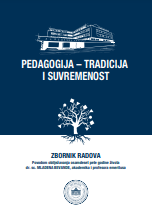DRUŠTVENA UVJETOVANOST OVOVREMENIH PEDAGOŠKIH PERSPEKTIVA
SOCIAL CONDITIONING OF CURRENT PEDAGOGICAL PERSPECTIVES
Author(s): Selvedin Delić
Subject(s): Education, Higher Education , Sociology of Education, Pedagogy
Published by: Filozofski fakultet Univerziteta u Sarajevu
Keywords: market fundamentalism; curriculum reform; learning outcomes;
Summary/Abstract: We witness that market fundamentalism occupies a very important place in the normative and value pluralism of postmodern permissiveness and freedom. In such a social environment, under the pressure of neoliberal capitalism and technological progress, educational policy increasingly directs upbringing and education towards learning outcomes, skills and competencies that advocate a market-oriented man, i.e. a man who gradually becomes a “mechanistic element, a resource” in already defined political-economic relations. With this paper, we draw attention to the marginalized position of the child - man in contemporary society. It is already obvious that almost all forms and models of traditionally based and functional pedagogical theories are being rejected, and that in parallel, within the framework of neoliberal principles of scientific pluralism in economics, psychology, sociology and even in pedagogy itself, new paradigms and concepts/ models of upbringing and education are being developed. Today, pedagogy itself is increasingly moving away from the child, and to make the paradox even greater, this is often taking place under the banners of romantic-pedagogical marketing “child centered approach”, “student as the subject of teaching”, “school for life”, etc. Various forms of neoliberal pedagogy based on the pedagogical looseness of the so-called summer-hill pedagogy are emerging and developing, thus offering a whole series of short-term “instant solutions” whose application makes teaching understood as an event, and less and less as an experience for students. Accordingly, while reforms are “embellishment” certain segments of the education system, we are witnessing the increasing degradation and marginalization of the quality upbringing and educational fabric that exists in public schools. In this paper, we describe the social conditioning of contemporary pedagogical perspectives within the framework of the pedagogical-didactic understanding of the competency-based approach to education - curriculum reform. In this paper, we compare the characteristics of the theory of curricula and programs created within the framework of spiritual-scientific pedagogy and didactics on the one hand, with the characteristics of the concept of curriculum reform created within the framework of behavioral learning, on the other. The topic is the reform of curricula and their reliance on defined key competencies and the moving from national to international understanding and curriculum development. The paper also critically reflects on the process of operationalizing key competencies at the micro-pedagogical level, on the process of orienting teaching towards objectively measurable learning outcomes, emphasizing that this process can ultimately take place to the detriment of the humanistic understanding of education, as well as the loss of the educational dimension of school and/or the purpose and values of education.
Book: Pedagogija – tradicija i suvremenost - zbornik radova
- Page Range: 71-92
- Page Count: 22
- Publication Year: 2025
- Language: Bosnian
- Content File-PDF

